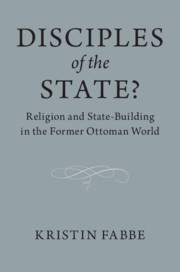Book contents
- Disciples of the State?
- Disciples of the State?
- Copyright page
- Contents
- Figures
- Tables
- Preface
- Acknowledgments
- Transliteration of Modern Greek
- Pronunciation of Turkish
- Transliteration of Modern Turkish, Ottoman Turkish and Arabic
- 1 Introduction: Religion and the Quest for State Sovereignty
- 2 Creating Disciples of the State
- 3 The Ottoman Imperial Footprint and the International Context
- 4 The First Reformer: Egypt under Muḥammad ʿAlī
- 5 Synthesizing the Religious and the National in a Revolutionary and Irredentist Greece
- 6 The Religious Roots of the “Secular” State: Understanding Turkey’s Sacred Synthesis of the Religious and the National
- 7 How the Religious and the National Diverge: Evidence from Egypt
- 8 Sacred Syntheses, the Politics of Exclusion and the Prospects of Liberal Democracy
- 9 Conclusions
- Postscript: Sacred Synthesis Undone in Turkey?
- Notes
- Bibliography
- Index
8 - Sacred Syntheses, the Politics of Exclusion and the Prospects of Liberal Democracy
Published online by Cambridge University Press: 21 March 2019
- Disciples of the State?
- Disciples of the State?
- Copyright page
- Contents
- Figures
- Tables
- Preface
- Acknowledgments
- Transliteration of Modern Greek
- Pronunciation of Turkish
- Transliteration of Modern Turkish, Ottoman Turkish and Arabic
- 1 Introduction: Religion and the Quest for State Sovereignty
- 2 Creating Disciples of the State
- 3 The Ottoman Imperial Footprint and the International Context
- 4 The First Reformer: Egypt under Muḥammad ʿAlī
- 5 Synthesizing the Religious and the National in a Revolutionary and Irredentist Greece
- 6 The Religious Roots of the “Secular” State: Understanding Turkey’s Sacred Synthesis of the Religious and the National
- 7 How the Religious and the National Diverge: Evidence from Egypt
- 8 Sacred Syntheses, the Politics of Exclusion and the Prospects of Liberal Democracy
- 9 Conclusions
- Postscript: Sacred Synthesis Undone in Turkey?
- Notes
- Bibliography
- Index
Summary
- Type
- Chapter
- Information
- Disciples of the State?Religion and State-Building in the Former Ottoman World, pp. 149 - 184Publisher: Cambridge University PressPrint publication year: 2019



